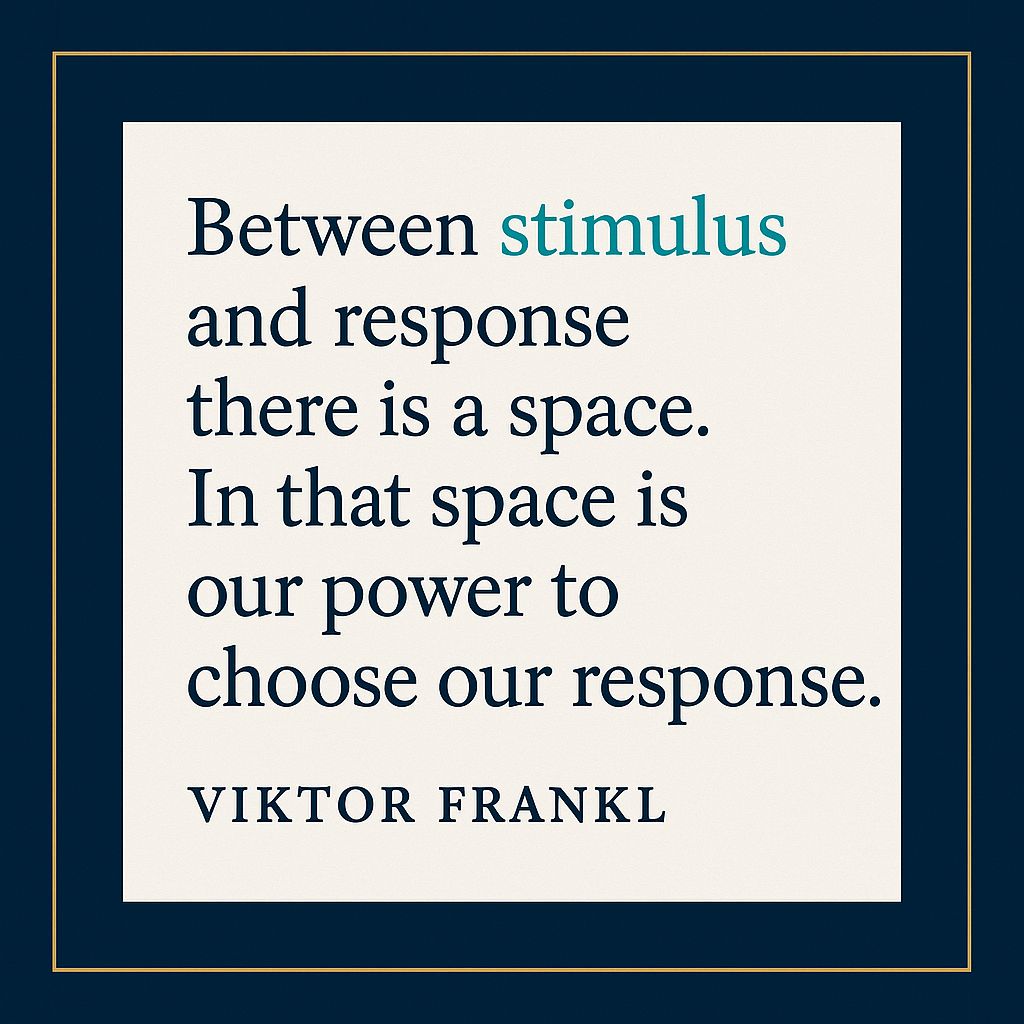Acting on Awareness
To all the new subscribers this week: thanks for joining us!
We’re on week three of our Emotional Intelligence Series. Check out the archives for the first and second issues of the series.
We’re exploring self-management this week, and it all starts with self-awareness. We covered self-awareness last week and gave you some tips and tricks to practice. Now, we can take that practice a step further and learn how to use our self-awareness to influence our behaviors and manage our responses in line with our own expectations.
We’ve all been there. You’re frustrated with a coworker, child, or friend. You go off on them, yelling over a very small incident. It’s not the response you wanted to make, but it’s the one your emotions pushed you toward. Self-management is the ability to control your feelings and deliberately choose your behaviors and responses to strong emotions.

Image created by ChatGPT
How self-management helps you lead:
Leaders face dozens of choices every day, and they are tasked with putting out fires, solving problems, and helping their employees succeed. Emotions can make those efforts challenging some days. For example, the day you’re supposed to train the new hire just so happens to be the same day you have call-offs. Next thing you know, the new hire walks in out of dress code, and you lose it.
Self-management helps you see the forest through the trees. Instead of getting tunnel vision, leaders with strong self-management skills will understand how to take a pause, reassess, and move forward without their judgment clouded by emotion. Self-management is a tool that enables you to put your self-awareness insights into practice, allowing you to respond appropriately to each situation.
The Benefits of Self-Management
Increased confidence to lead authentically with the knowledge that you can remain calm in stressful situations.
Consistency in interactions fosters a stronger team, with a greater emphasis on trust and psychological safety.
Improved mood and well-being due to better responses to stressful situations.
Adaptability fostered by the ability to adjust quickly without becoming overwhelmed.
Becoming better at self-management is one of the most effective ways to enhance your leadership skills and build a stronger team. Leaders who excel at self-management are more effective because they provide their team with consistent leadership, regardless of the situation or circumstances.

Image created by ChatGPT
How to practice self-management:
Your self-awareness insights will help you apply these four practical self-management tips below. Not every situation is going to cause you stress or force you to use your self-management skills. You need to have self-awareness to recognize which situations or decisions will stress you—forcing you to leverage your self-management to adapt and overcome.
Four tips to manage yourself. The first two are to help you in the moment when you identify a situation you struggle to control emotions in, and the second two are holistic approaches to help you manage yourself and your stress better long term:
Control your mindset. I’m not here to prescribe you a particular mindset, but I will say you need to be the one in control of it. Mindsets are infectious. One negative teammate can destroy a team of top performers. You need to determine how to drive positive thoughts while maintaining realistic expectations.
Breath. Yes, you probably expected it, but it’s not something to gloss over. When you’re stressed, you start to breathe shallower. Shallow breathing occurs when you breathe without expanding your diaphragm. This means your body is getting less than the optimal amount of oxygen it needs to sustain itself. Try it out next time you’re stressed. You’ll be able to feel your body adapting to increased oxygen flow.
Practice yoga, meditation, or boredom. All these aim at the same goal: slowing down. We tend to move through tasks, people, and emotions rather quickly in our fast-paced world. It’s beneficial to train your brain to work at a slower pace without constant motion. Building your brain’s capacity to handle boredom and deliberate focus will help you adapt to emotional responses before just reacting to them.
Sleep and exercise. The final tip to help you out in the long term is focused on preparing your body for stress. Healthy sleep hygiene and regular exercise are the best way to ensure your body is capable of handling daily stress. If you want to be in control of your emotions, you have to be willing to set up the conditions for success!
Over the next week, you can use the first two tips to help you respond differently than you have in the past (these insights come from last week’s self-awareness exercise). Use your emotional triggers to pick out one or two specific situations or emotions that you would like to respond to differently. Keep a journal and evaluate your progress!
There is a wealth of fascinating information and interesting stories available regarding emotional intelligence. If you want to dive deep into the world of EQ, I recommend two books for you to check out:
Primal Leadership by Daniel Goleman, Richard E. Boyatzis, and Annie McKee.
Emotional Intelligence 2.0 by Dr. Travis Bradberry and Dr. Jean Greaves.
Before you leave:
Good luck getting better at managing yourself this week! I’m always here to help you out should you ever be in need.
Be sure to check out my YouTube channel for more content. I’ll be releasing a weekly newsletter recap video where I’ll cover everything in this edition in much greater detail. Be sure to check it out on Thursday!
Get ready for the next issue of our emotional intelligence series, coming out next Tuesday. We’ll be moving outward to focus on social settings and relationships over the next two weeks!
Keep more of what you earn
Collective helps members keep more of what they earn — saving an average of $10,000 a year in taxes* — while taking countless hours of administrative work off their plates.
Your membership includes LLC and S Corp formation, payroll, monthly bookkeeping, quarterly tax estimates, annual business tax filing and more.
*Based on the average 2022 tax savings of active Collective users with an S Corp tax election for the 2022 tax year